 | « Back to article | Print this article |
Should we be exposing our women volunteers to the barbarity of actual combat, ask Lieutenant General Ashok Joshi (retd) and Colonel Anil A Athale (retd).
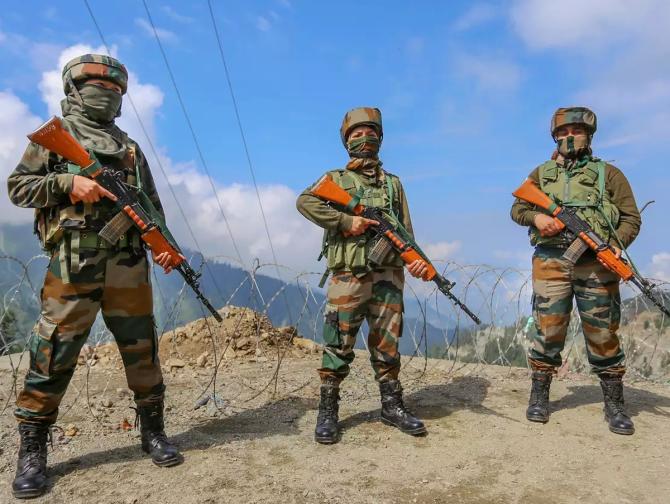
The raison d'etre for the Armed Forces is to protect and defend the principal assets and interests of the nation mainly by using physical force.
It is the 'final argument' when all else does not succeed.
The Armed Forces do undergo administrative and other organisational changes but their purpose is to improve effectiveness and efficiency, as also to ensure that the country gets full returns for what it invests by way of human and other capital.
The Armed Forces ought not to be looked upon merely as a source of employment, much less as equal opportunity employers.
If at some future date, robots were to take over fighting, the Armed Forces would employ them, and reduce men and that were performing those functions.
Armed Forces are meant to protect democracy and equal rights, NOT practice it within its own structure and organisation.
Wars can neither be fought nor won on democratic principles; these are nasty and brutish aspects of human existence since times immemorial.
Of all the countries in the world, a pacific India has paid a huge price for its misplaced chivalry and karuna, and must never forget this lesson.
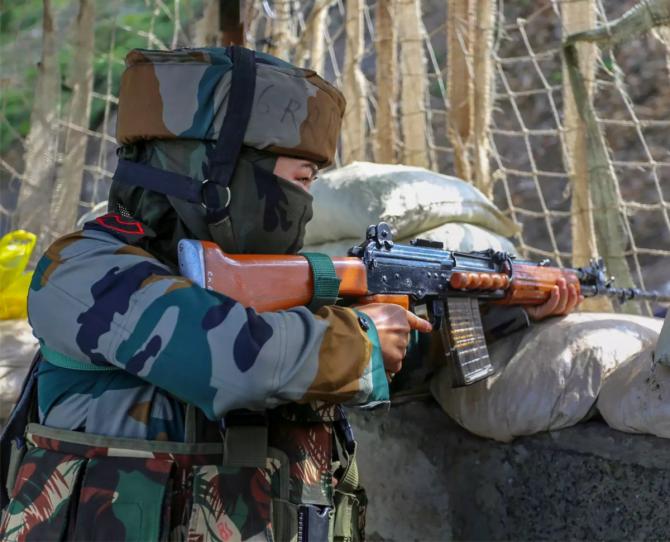
Now that the decision has been taken to accept women cadets in the National Defence Academy, here are some ideas about how the decision can be implemented.
We intend to deal only with the possible role of women in the Indian Army.
As to their place in the Indian Air Force and Indian Navy, the issue is best left to those who understand these two services better.
There is a great difference in the working environment and battlefield requirements between these two services and the Army.
In the case of the Air Force, it is only the pilots and the crew who fight, while the rest are in supporting roles.
An individual Air Force pilot is akin to a gladiator, while in the Navy the fighting unit is a ship comprising several individuals.
The living conditions do not change whether the ship is actually fighting or not.
Air war consists of short and intense engagement, at the end of which the pilot returns to his base.
In the case of the Army, battles last for days on end, and human endurance is taxed to its limits.
Thus when one considers the role of women in the Armed forces, it is better to consider it service wise rather than lump them together.
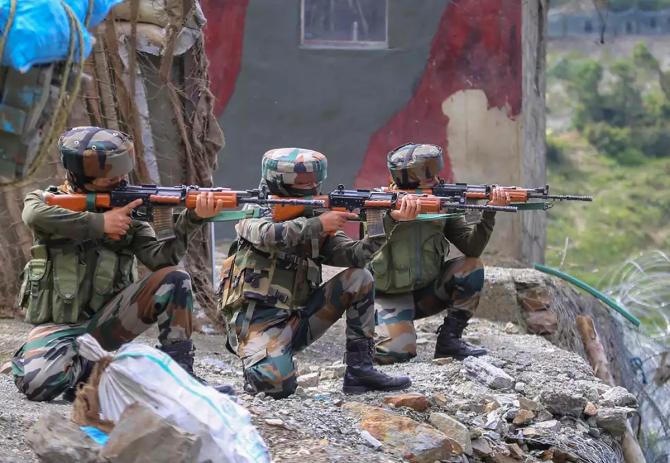
Something about the domain and nature of war: The only abiding principle is that wars have to be won.
Let it be clear right at the outset, bullets don't distinguish between men and women and wars are an activity that is 'lawless.
A nation must prepare and plan to win battles, campaigns, and wars.
Adequacy of means adopted to do so has only one test: Success. Everything is fair in war.
Moral or ethical considerations are meaningless. They can prevail only in peace, before or after the war. Losers have no rights. We in India should know.
Although our two epics have war as the central theme, for reasons that remain hidden from us, strategic culture eluded us, and we became easy prey to invaders whether they came through the Khyber Pass, or landed from ships.
We would do well to remind ourselves that the role of the Armed Forces is to prevail in war and do their utmost not to lose even a single battle.
The Armed Forces should not be treated as 'equal opportunity' employers at the cost of their effectiveness, or efficiency.
From among the volunteers who offer themselves for service in the Armed Forces, only those who meet the laid down standards should be accepted, and that too on a competitive basis.
These considerations have generally prevailed: Women have been serving in the Medical Corps for decades, and at least one of them reached the highest ranks.
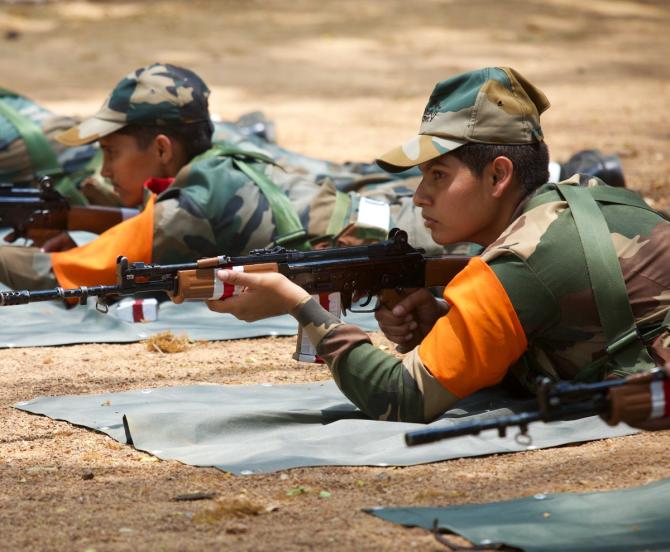
Are women better than men intending to the sick and the wounded? The answer is, yes.
Should they also be eligible for commission in all arms and services? The answer would seem to be only a qualified, yes, that is if they are likely to improve the efficiency and/or effectiveness of the parent organisation, and on a competitive basis at that.
The women need not look upon joining the Armed Forces as a challenge to their womanhood. There is nothing that women have to prove at this point of time.
That happened a long time ago. In contemporary times, the Rani of Jhansi was known by the British as the Queen of 'Pandies', but no one doubted her valour.
She was a 'man among mutineers', wrote Sir Hugh Rose, who led the British forces against her. She used to dress like a man (with a turban) and rode like one.
General Rose had to take to the field to defeat her.
Many among her enemies felt that she had better strategic and tactical ability than anyone else on either side.
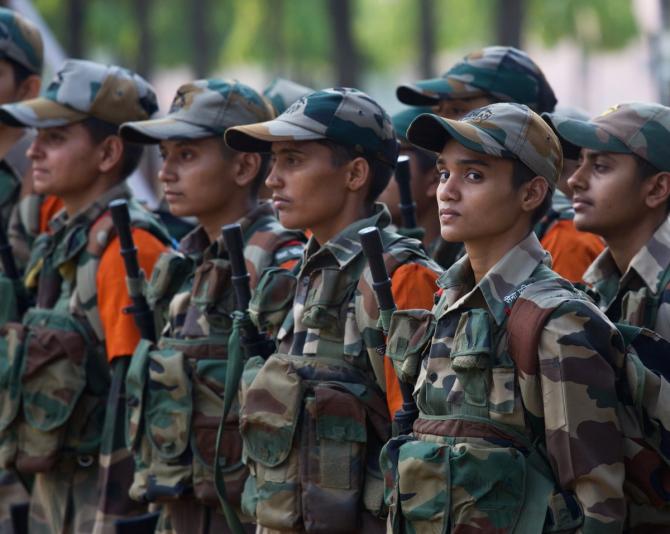
There have been many other examples of women leaders like Chandbibi of Ahmednagar, Rani Chennama of Kittur and the redoubtable Queen Tarabai who defeated Aurangzeb.
And this was so when battles were won or lost in hand to hand fighting when skulls were split open with cavalry sabers.
War was brutal then, and it is brutal now. Because the force is applied from a long standoff distance, the ugliness and barbarity involved are not directly visible, except at the receiving end. But they are there all the same.
Should we be exposing our women volunteers to the barbarity of actual combat? Very few would say yes.
And what about the fear of being taken prisoner of war? What happened to Captain Kalia in 1999 during the Kargil battles? The answer would be, 'We have no reason to expose women to such possibilities'.
We are not short of manpower or volunteers in India.
Two simple considerations can guide us in determining the participation of women in the Armed Forces:
1. Women officers should not be allowed to serve ahead of Corps rear boundaries;
2. Women officers should have the potential to add to the effectiveness and efficiency.
In no case, should the standards have to be lowered.
Every arm and service, and all field formations, can carry out such an exercise.
The Judge and Advocate General's department, for example, can absorb many women.
It should be possible to compute the available slots and the number of vacancies for women cadets on that basis.
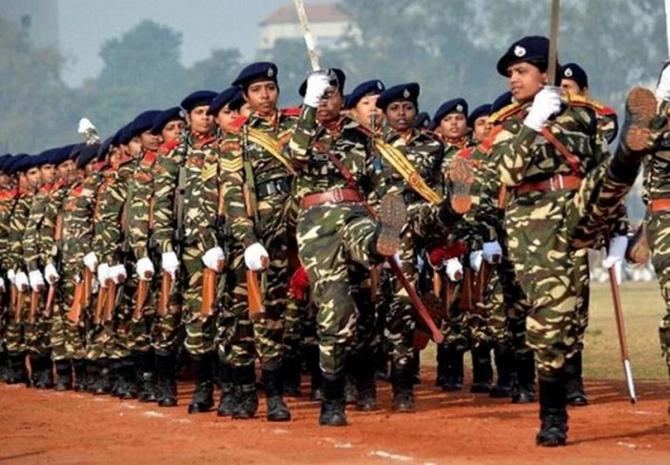
It has been sometime since women have been enrolled in the armed forces the world over.
There is a rich source of experience available in those countries. It will be worthwhile to form a study team and find out the administrative and tactical issues faced by these armies and learn from them.
Much of the inspiration for a role for women in the army seems to come from the USA. Indian and US social conditions differ vastly and it would be unwise to follow them blindly. We do not have a dearth of volunteers among men.
We should also be mindful of the fact of the crumbling family system in the USA and its repercussions on its society and the country at large.
The family unit forms the nucleus of society, and the nation and has been in existence since the dawn of civilisation.
It is also a 'natural' organisation that is part of our DNA like it is in many evolved animal species.
A growing child experiences selfless and devoted care basically from the mother.
A healthy family revolves around a mother.
Is it not too much to ask of a woman to bring up well-adjusted children, while serving in the Armed Forces under exacting conditions?
In the second decade of the twenty-first century, India faces daunting challenges on the security front.
Geo-political changes in the neighbourhood and looming threat from a rising superpower like China has brought forward the likelihood of a conflict far closer than many think.
At this time any tinkering with the basic organisation that puts an extra burden on the leadership and administration in pursuit of illusive man-woman 'equality' may best be avoided.
Litigation to enforce equality may not yield what we are looking for: The creation of opportunity for women to serve in the Army without creating an adverse impact on its effectiveness.
The best course would be to take decisions after trials spread over a decade, at the end of which a commission could be appointed to evaluate the impact of the decisions and apply course corrections if any.
Lieutenant General Ashok Joshi (retd) served in the Indian Army for three decades. He was the Chhatrapati Shivaji Fellow at Pune University and author of Restructuring National Security (Manas Publications, 2000).
Military historian Colonel Anil A Athale (retd) is a former Chhatrapati Shivaji Chair Fellow at the United Services Institute of India.
Feature Presentation: Rajesh Alva/Rediff.com